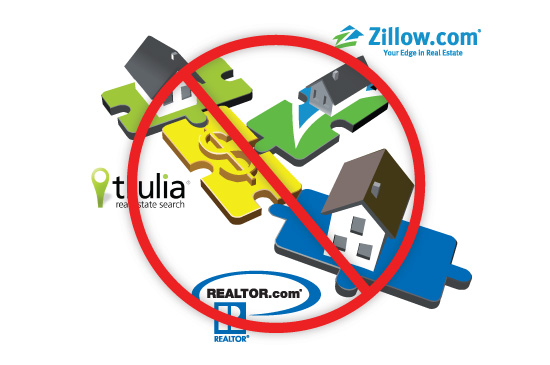
By Tara Steele, AGBeat
Third-party real estate media sites Realtor.com, Trulia and Zillow have come under fire recently, with small brokers in the spotlight making public declarations as to which listing sites they will not syndicate to and why. In January, we reported that San Diego-based Abbot Realty Group (ARG) President and Managing Broker Jim Abbott released a video on YouTube explaining why ARG will no longer permit third-party syndication sites like Trulia, Realtor.com and Zillow to syndicate its listings, but will continue to syndicate company listings to the local MLS, Sandicor.
Last fall, AGBeat broke the story that 75 big brokers were rumored to be considering refusal of syndication of their listings, suspecting that others would also follow. ARG’s plea for industry professionals to consider their own syndication and for buyers and sellers to do their homework is a more tangible, public-facing and viral proclamation than other brokers have delivered to date.
Abbott now offers an update of how his business has been impacted in the last three months, making allegations that Zillow directly contacted the brokerage’s customers to inform them of ARG’s choice to cut their syndication feed, calling ARG’s competence into question. Abbott says they have not lost one seller and homes are selling faster, noting, “Let me assure you, there is life after listing syndication and it’s a better life. No more sad messages from disappointed buyers calling on properties that sold months ago. No more frustrated buyers forced to comb through thousands of unavailable homes. No more wildly incorrect value estimates and improbably mortgage offers.”
Boutique Brokerage Pulls Listings From Trulia
Most companies that have pulled listings from syndication sites have primarily cited inaccuracy of data, but The Goodlife Team, a boutique brokerage in Austin, has publicly declared it will not syndicate to Trulia, noting that ads for competing agents are routing calls on the properties it lists away from Goodlife, thus breaking their brand promise to sellers, as their policy is to respond within a certain time frame to all inquiries on listings.
Goodlife’s CTO Jack Miller said that Trulia ads underperform for them, and until the company makes changes to its policies to allow Goodlife to offer consistent customer service, it will not syndicate listings on the site.
Other Voices Weigh In
When ARG originally de-syndicated, AGBeat reached out to Zillow and Realtor.com, who chose not to comment on brokers pulling listings from syndication, but Trulia’s company spokesperson, Ken Shuman, said, “The accessibility of open and accurate listing information benefits everyone in the homebuying and selling process – consumers, agents and brokers. We know that Trulia has a transaction-ready consumer audience, and we are confident that brokers and agents who syndicate their listings to Trulia have a greater opportunity to meet new clients and close more transactions.”
Alex Zoghlin, CEO of VHT Inc. told AGBeat, “I’m not surprised there’s an escalating firestorm over third-party listing aggregators. They’re using brokers’ most valuable assets to make money, build their businesses and divert customers away. Contrary to what many brokers believe, their competition isn’t the brokerage down the street – it’s the fast-growing, third-party ecosystem of listing aggregators, online publishers, virtual tour providers, advertising networks and media companies that are dominating search engine results in order to capture online leads.”
Zoghlin explains, “Popular search engines such as Google strive to balance user experience with revenue opportunities. They aggregate information and provide users with relevant and unbiased search results and links to authoritative sources of data. They separate organic results from sponsored ads, knowing that too many ads on top erode consumer confidence in their brands.”
“But real estate aggregator sites don’t hold themselves to the same standards,” Zoghlin adds. “They make it difficult for consumers and search engines to determine who owns the property listings displayed on their sites and make it harder to for brokers to use their own websites as a lead generation tool. They ‘cook their search results by giving preferential treatment to agents/brokers who pay for featured listings. They provide incorrect property details and out-of-date information that frustrates consumers and reflects poorly on brokers.”
What many believe kicked off the entire listing syndication debate was the Milwaukee brokerage Shorewest pulling its real estate listings from syndication last fall. WAV Group Partner Victor Lund told AGBeat in early 2012, “Shorewest is the No. 1 website in their market, and they do not syndicate – proving that brokers and agents do not need to syndicate to drive traffic and leads on their listings. In fact, this may argue that the opposite is true – if you do not syndicate, you provide consumers with an incentive to visit your broker or agent website to find the cheese. In this case, the cheese is listing accuracy, comprehensive listing inventory, and most of all, the service of a real estate professional.”
© 2012 AGENT GENIUS
REPRINTED WITH PERMISSION
I really think that we all should take a hard look at this business model we ‘supposedly’ need. It would be great if brokerages finally get a backbone & take charge again of their own listing data. Our company sites would be busier & agents busier also.